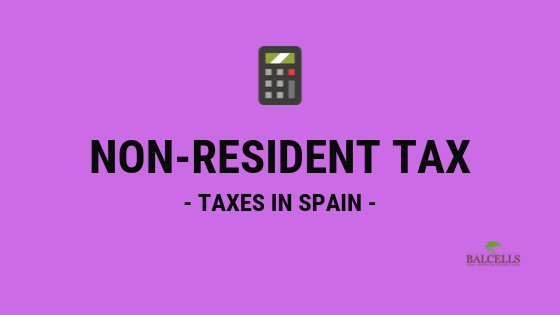Do you have a property in Spain but live less than 6 months in the country per year? Then hold on for a second. Because you need to pay non-resident tax. And failing to do so can have important penalties. But, luckily, in this article we explain in detail when exactly are you required to pay the income tax as a non-resident and which are its exact rates.
SHOULD I PAY NON-RESIDENT INCOME TAX IN SPAIN?
Let’s start by defining who are the individuals liable to this specific tax.
The non-resident tax applies to those who spend less than 183 days per year in Spain (non-residents), and earn any kind of income in the country.
As opposed to tax residents, who need to declare their worldwide income, the non-resident income tax is just levied on the incomes you earn in the country.
So, basically, if you meet the 3 following requirements, you must pay the IRNR:
- You live in Spain for less than 6 months per year
- The core of your professional activities is not based in Spain
- Neither your children and spouse live in Spain the whole year
To sum up, if you are a non-resident and possess any kind of assets in Spain (like a property that you rent out shares, bonds, royalties from intellectual properties, ec.); you will be liable to pay non-resident tax.
HOW MUCH SHOULD I PAY FOR MY NON-RESIDENT TAX EXACTLY?
The non-resident tax represents a flat rate of 24%.
No deductions or allowances can be applied here. Nevertheless, as we will see in a second, the total amount of this tax to be paid every year is not that high.
HOW TO LODGE YOUR NON-RESIDENT TAX AND PAY FOR IT
Many foreigners don’t know they need to pay this tax.
And, in fact, no one is going to come and tell you about it. It’s your responsibility to know. (That is why having a personal account as a foreigner can be that beneficial).
And failing to pay the non-resident tax means that you will pay an important fine on the following year. This sanction includes the amount you failed to pay plus an extra 100 or 150% of that sum.
So make sure to have your tax obligations up to date!
In that sense, this tax for expats must be paid before the 31st of December of each year. It accounts for the whole natural year (from January to December).
Nevertheless, if for example, you bought your property in June, you will only pay for the remaining 6 months.
PRESENTING THE NON-RESIDENT TAX FORM
How to do it?
You will need to present the model 210, filled out. It mus include:
- Your personal information
- Tax identification number
- Bank account
- All the details regarding the assets you have in Spain and you earn from them
NON-RESIDENT TAX ON RENTAL INCOME
Let’s now dive into the most important part for you: the tax implications of owning a property as a non-resident.
We will soon review each of them, but no matter if you rent it out or not, you will pay two different taxes on your Spanish property:
- The IBI or council tax. This tax is paid once a year to the local government in which your property is located in. The exact amount is calculated based on the cadastral value attached to the house/flat.
- The income tax, included in your tax return. This specific tax for non-residents is a bit more complex, so let’s analyze the two possible scenarios in regards to your rental income.
INCOME TAX WHEN RENTING YOUR PROPERTY
Let’s say that you own a house in Spain, and you rent it out yearly to your tenants.
In that case, you will need to pay a flat rate of 24% on the income you earn due to that. Again, remember that no allowances or deductions can be applied here.
And you will have to pay that percentage yearly through your tax returns.
INCOME TAX WHEN NOT RENTING
But what happens if you don’t rent your property out?
Then you still need to pay income tax. Yes, still pay income tax even though if you not rent the property and earn any income.
You will pay what it is called “imputed income tax”. And it is levied on the fictional income you would obtain if you effectively had tenants.
How is the exact amount calculated?
It is simple: you apply the same 24% flat rate, but to 1,1% or to 2% of the cadastral value of your property.
The cadastral value is the valuation that your town hall makes of your property. This means, an estimation of how much it is worth. It is usually below market value.
How can you find that value? Simple: in any of your local tax bills.
Out of that value, you apply a 1,1% if that value was revised after 2008; or a 2% if it was not. Then, 24% of the remaining result.
Let’s see that trough an example.
PRACTICAL EXAMPLE
Meet Helen.
Helen spends just one month per year in Spain to see some of her relatives. But she is from the United States, where she resides habitually.
She has a property in Spain with a market value of 150.000€, but with a cadastral value of 80.000€ (value emitted by the local town hall of the city in which the property is located).
As that value vas revised in 2010, the exact rate to be applied is 1,1%.
So, in order to understand how much will Helen pay as for the non-resident tax on her property, she first gets a 1.1% of the 80.000€. That equals 880€.
Upon that amount, she applies the flat rate of 24%, equaling 211.20€.
211.20€ is the total amount she must pay for her property.
HOW TO OPTIMIZE YOUR NON-RESIDENT INCOME TAX
As you have seen, staying up to date with this tax is crucial in order to avoid sanctions.
That is why having a team of tax lawyers next to you is somewhat essential: they will handle and file your tax returns so you don’t need to worry about anything.
Making sure you submit them on time and without missing anything!
Hence, if you need help with your Spanish taxes, do not hesitate to contact us. We will be glad to help you out!
Book a consultation with one of our lawyers and solve all your doubts:



